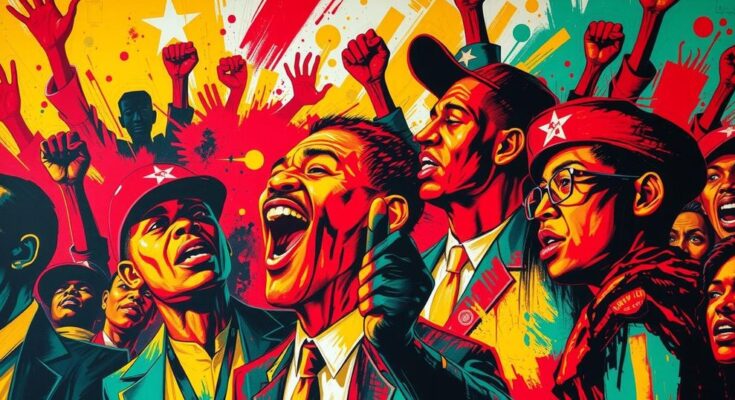Nigeria is currently facing significant political and social challenges, including political defections and governance issues reflecting deeper systemic problems. Key events involve disputes within the legislature, emergency declarations by the President, and corruption cases that highlight ongoing struggles. The author raises crucial questions about the future of Nigeria, echoing long-standing sentiments about the nation’s direction.
Title: Political Turmoil and Social Strife: Nigeria’s Ongoing Struggles
Fast Summary: Nigeria faces ongoing political turmoil and social issues that reflect deep-rooted challenges within its governance system. Recent events, including the dramatic actions taken by President Tinubu and the defection of key political figures, have garnered attention. Issues surrounding corruption and social unrest underscore the need for continued dialogue about the nation’s direction. The author raises poignant questions about Nigeria’s future, echoing sentiments from decades past.
Article Body: A whirlwind of political events has transpired since my last opinion piece, provoking my curiosity and bewilderment. I feel almost compelled to share my observations, which range from intriguing to downright baffling. Recent headlines remind me that Nigeria is still a maze of drama and discontent.
Let us start with the spectacle in the Upper Legislative House involving Senator Natasha Akpoti-Uduaghan and Senate President Godswill Akpabio. What began as a dispute over a seating arrangement escalated—fast. Personal attacks and mudslinging unfolded in what should have been a serious political discussion. This incident reveals a troubling truth about our leaders: personal egos and power struggles seem to overshadow national issues that actually deserve attention. The allegations against Akpabio and the ensuing suspension of Akpoti-Uduaghan left many aghast.
In a related matter, President Tinubu’s declaration of a state of emergency in Rivers State has stirred controversy. The governor, his deputy, and assembly members were suspended for six months, raising eyebrows about the legality of such a decision. I found myself drawn into a swirl of opinions, often feeling overwhelmed by the lack of clarity. The Nigerian Bar Association criticized this move, calling it a “dangerous affront” to democracy—a sentiment that resonates strongly with many citizens. The accountability mechanisms designed to check power seem to be breaking down.
Shifting focus, the recent defection of former Kaduna Governor Nasir El-Rufai from the All Progressives Congress (APC) to the Social Democratic Party has also captured attention. El-Rufai claims he is rescuing Nigeria from its current struggles, which feels ironic given that he had a hand in shaping the very crisis he now condemns. His justification strikes me as comical; it seems more like a political maneuver than a genuine act of patriotism.
Then there is Delta State, where political alignment has shifted dramatically as officials abandon the Peoples Democratic Party (PDP) for the ruling APC. Their reasoning? A desire to be closer to the federal government. This trend raises alarm bells about the potential slide towards a one-party state, a notion that the Presidency has dismissed as mere political theatrics from opposition members.
Amidst this political theatrics, common Nigerians are left shaking their heads in disbelief. The exclamations of “Omo!” resonate deeply, reflecting a mix of displeasure and frustration.
However, the political sagas are not the only troubling narratives. Reports have surfaced regarding the possible misappropriation of ₦71.2 billion intended for student loans, an issue now under investigation by the Independent Corrupt Practices and Other Related Offences Commission (ICPC). Meanwhile, the Warri Refining and Petrochemical Company has remained non-operational since January due to safety concerns—contrary to the earlier grand promises of its resumed operations. Results have shown the Port Harcourt Refinery is underperforming, further fueling disappointment among citizens.
The weight of these observations compels me to utter a few questions rather than provide solutions. The same query posed by Sunny Okposo decades ago persists: “Which way, Nigeria?” This refrain still haunts the nation, underscoring its aimlessness amidst failed promises and poor governance. Our leadership loop seems unrelenting, and the frustration among citizens continues to climb.
Artists have long echoed this sorrowful sentiment through music, serving as a wake-up call to a seemingly dormant populace. From African China’s poignant “Mr. President” to Eedris Abdulkareem’s “Jaga Jaga” and Falz’s “This is Nigeria,” the messages of dissatisfaction remain unwavering. They portray a nation suffocating under the burdens of corruption, division, and insecurity, a situation that needs urgent intervention.
As I pose more questions, I wonder how long it will be before Nigeria evolves into the vision shared by Timi Dakolo in his rousing tracks? When will Nigerians feel pride in service to our land? There is a dire need for a collective effort in realizing a nation free from oppression where peace and justice prevail. Until these questions find answers, I remain compelled to ask: Which way, Nigeria?
In summary, Nigeria’s current landscape of political dysfunction and social discontent presents a troubling image of a nation searching for direction. Recent controversies involving party defections, government actions, and ongoing corruption scandals signal deep-rooted issues that need to be addressed. The artistically echoed cries for change remind us of the urgent need for a collective effort towards a future where governance aligns with the aspirations of the citizens.
Original Source: www.thisdaylive.com




